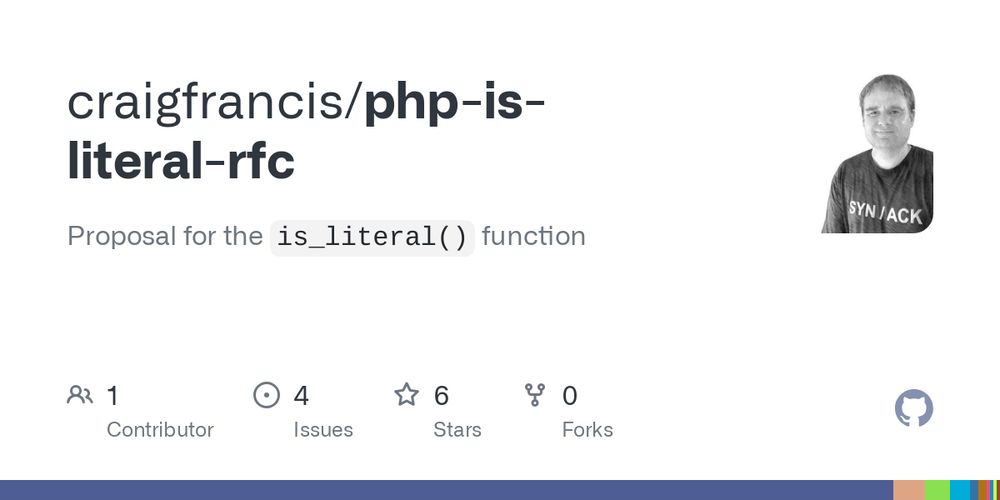What I was getting at - I hope for a future where the easy to do is the secure option, with programmers having to really go out of their way to do something dangerous.
09.08.2025 14:17 — 👍 1 🔁 0 💬 1 📌 0
Why is the last one the easiest to type, read, and dare I say it understand?
(not actually understand, if you did then you wouldn’t do this, but anyway).
08.08.2025 22:53 — 👍 0 🔁 0 💬 1 📌 0

Baby purple plant, it’s so cute.

It’s starting to grow, and is in a new pot.

It’s now a good size, providing a bit bit of colour while next to the window.

Ahh, it’s taken over, what happened; it’s taking up all of the space, and some more.
This is one of my baby plants :-)
12.06.2025 11:23 — 👍 1 🔁 0 💬 1 📌 0

php-is-literal-rfc/examples/sql-basic.php at 9e9223a4b98987166938f53b4c4bd37ed7cd50e9 · craigfrancis/php-is-literal-rfc
Proposal for the `is_literal()` function. Contribute to craigfrancis/php-is-literal-rfc development by creating an account on GitHub.
With identifiers in SQL, this should either be a developer defined string in the SQL (e.g. have an allow-list array, where the key is an alias or numeric offset, the values are the SQL)… or, your database abstraction should have a way to parameterise, e.g. $aliases in:
github.com/craigfrancis...
08.02.2025 11:35 — 👍 0 🔁 0 💬 0 📌 0
Yep, I’ve got some examples in PHP:
github.com/craigfrancis...
If memory serves, you’re using Go atm; so this is how I would start, with a package that’s for the database abstraction (maybe taking an SQL string, or individual parameters for an ORM):
github.com/craigfrancis...
08.02.2025 10:53 — 👍 1 🔁 0 💬 1 📌 0
I would add that developers still make mistakes with prepared statements (especially when the SQL string is built via complex conditions/concatenation/etc, or junior developers make edits), so you must also validate the SQL strings are developer defined:
eiv.dev
07.02.2025 21:26 — 👍 1 🔁 0 💬 1 📌 0

Are you safe from injection vulnerabilities?
Even using abstraction layers like Doctrine or parameterised queries mistakes can still happen.
@craigfrancis.bsky.social shows us how mistakes can be made and what can be done to mitigate them.
Buy your ticket here: https://buff.ly/40Ck2WR
#phpuk
22.01.2025 10:00 — 👍 1 🔁 1 💬 0 📌 0
Agree completely, it’s why I see all automated pen test results as the first draft… they are just the start of an investigation, where results could be discounted immediately, or be part of a discussion with the developer. Also, no found “issues” does not mean the system is 100% secure.
20.01.2025 17:25 — 👍 0 🔁 0 💬 0 📌 0
I believe it’s to cover a user following a link to the API (maybe from an email, or malicious link), if the API can return HTML content, it would be like a normal web page for the browser; so pen test tools like to see a ‘none’ CSP.
20.01.2025 01:43 — 👍 0 🔁 0 💬 1 📌 0
It’s how they got it to work, while they take a HTML string, a different package could take a CLI string in the same way.
So the functions first argument can be “convert ? -resize ? ?”, and because it’s unexported, that must be provided during compile time.
09.01.2025 12:39 — 👍 0 🔁 0 💬 1 📌 0
And, to prevent completely, use Google Safe HTML package as an example, and use an “un-exported string type”.
e.g. define a package/function where the first argument is for the command string, the rest get escaped as arguments… partial example:
github.com/craigfrancis...
08.01.2025 08:45 — 👍 0 🔁 0 💬 1 📌 0
Ending Injection Vulnerabilities
How programming languages and libraries can being an end to Injection Vulnerabilities.
I think a lot of people know about it, but mistakes still happen, and as an industry we haven’t implemented anything that actually stops it (e.g. ORMs often have a complicated interface).
eiv.dev
23.12.2024 11:54 — 👍 0 🔁 0 💬 0 📌 0
XSS vulnerabilities keeping you up at night? 😱 Google's new "Commitment to Secure by Design" whitepaper has answers! Safe Coding and web platform improvements are key. Read more (page 7):
static.googleusercontent.com/media/public...
16.11.2024 21:31 — 👍 8 🔁 2 💬 0 📌 0
Ending Injection Vulnerabilities
How programming languages and libraries can being an end to Injection Vulnerabilities.
SQL Injection still exists despite abstractions like ORMs, QueryBuilders, & Parameterised Queries; simply because it’s easy to make mistakes (especially for new developers). Programming languages could find/stop these mistakes by identifying “trusted developer defined strings”:
eiv.dev
29.11.2023 09:38 — 👍 2 🔁 0 💬 0 📌 0
Hello lovelies. This is my official account.. 💙💙
Glad to be over here from the "other place"😂
It's like breathing clean air again 👍🏼
Cyber security, climbing, caving and diving! 💜
computer security person. former helpdesk.
Your Only Source For Professional Dog Ratings
nonprofit: @15outof10.org ❤️🩹
links.weratedogs.com
She//her🌻 one in a million
Author, screenwriter, Lego builder. I’m @emmakennedy from the Bird Place.
Engineering manager @ Spotify
Frontend Masters & LinkedIn Learning Instructor
American in Sweden 🇸🇪
Momma to Freja ❤️
@dixie3flatline from twitter
head of dev advocacy @ minimus.io
kubernetes release team subproject lead, sig docs tech lead, uwubernetes, edinburgh via memphis
she/they
🦄 Node.js Secure Coding: http://nodejs-security.com
🌟 @GitHub Star
🏅 @OpenJS Pathfinder award for Security
🥑 DevRel at @snyksec
Co-leader OWASP Cornucopia. If you like what we do for open source, visit our code repository https://github.com/OWASP/cornucopia and give us a star ⭐
🌈 «Difference is of the essence of humanity» – John Hume
#appsec #owasp #cornucopia #threatmodeling
Husband, father and Mayor of the greatest city in the world. He/Him.
I like writing silly skeets, but that doesn't pay so I also make Google Chrome. mamá, Eng Director, volunteer at Second Harvest. 🇺🇲🇨🇷
Twitter: @__apf__
Encryption, HTTPS, certificates, web security, security UX, software engineering and management, TMI about parenting. Opinions are my own.
Google Chrome DevRel Identity Tech Lead - Anything about browser identity features: passwords, OTPs, passkeys, identity federation, digital credentials, etc
security enthusiast that loves hunting for bugs in the wild. co-founder and player of @justCatTheFish.
infosec at @google. opinions are mine.
From: https://twitter.com/terjanq
Tenured Faculty @c-i-s-p-a.bsky.social Helmholtz Center for Information Security
I help developers protect companies through better web security
Free web security training from PortSwigger.





